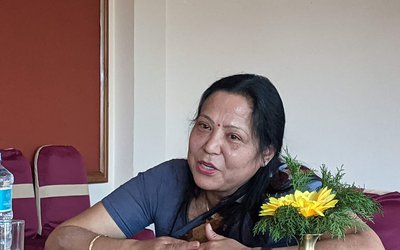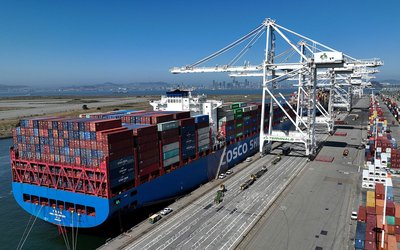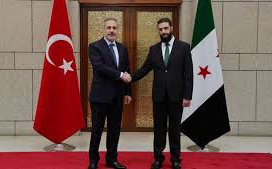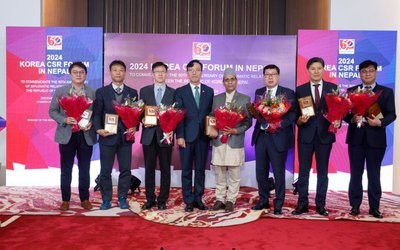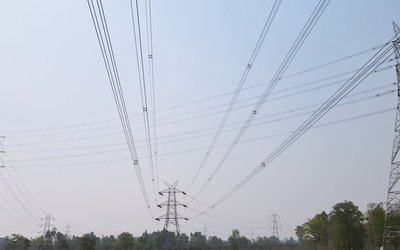VERENA GRAFIN VON ROEDERN, ambassador of Federal Republic of Germany to Nepal,is close to complete her four years tenure to Nepal. Ambassador VERENA GRAFIN VON RODERN in her written interview to NEW SPOTLIGHT discuss various issues of Nepal-German relations.
You have spent in Nepal the very critical time of Nepal's history. How do you see the overall situation of Nepal during your stay?
I share your opinion that my posting to Kathmandu coincided with very interesting and critical times in Nepal. The peace process was shaping up, election for the Constituent Assembly had just taken place, and the president and vice president were being elected the very day of my arrival in Nepal. The first government under the leadership of the Maoist party was formed a month later and little did I know that I would witness during my assignment to Nepal five different prime ministers from three different parties. Having extended my tenure by a year beyond the first three years, I hoped to see the promulgation of a new constitution, which unfortunately did not happen, though. The integration and rehabilitation of the Maoist ex-combatants made considerable progress, but time and again it was running into difficult waters. Out of the twin tasks present before Nepal, namely taking the peace process to its logical conclusion and writing an inclusive democratic constitution based on the rule of law, only the peace process has reached an irreversible stage. But a lot remains to be done on the constitution drafting front. Now consensus among the major stakeholders is important for preserving the achievements made by the past Constituent Assembly beyond its dissolution in order to move forward and find a solution to the remaining disputed issues including the future roadmap for overcoming the current political stalemate.
What is the state of relations between Nepal and Germany?
The diplomatic relations between our two countries were already established in 1958. Development cooperation started in 1961 and we have remained committed development partners ever since. Looking back, we have seen numerous high level visits, people to people contacts, a thriving NRN community in Germany, and a growing interest of Nepalese students to go for further studies to German universities. Over all, it is a very satisfying partnership which gets stronger by the day.
Germany has been supporting Nepal's overall development programs. How do you look at the programs implemented in Nepal under German support?
Germany has been one of Nepal’s most reliable development partners for over 50 years. Since the start of its activities in 1961, the German Federal Government has provided more than half a billion Euro in the bilateral development cooperation. Our support has been targeted to more specific sectors jointly agreed with the Government of Nepal. In doing so, we have been especially conscious of Germany’s distinctive expertise in providing for Nepal development needs. Supported by both technical cooperation/assistance through GIZ and financial cooperation/assistance through KfW Development Bank, our development cooperation has achieved remarkable results. Still it does not do well to be complacent but, all in all, the results have been quite encouraging. This is not to say that all goals have been reached and there is nothing more to be done, for development is a permanent process and the more you work for it the more new areas open up. There is no reason why our development programs should not be even more successful with continued cooperation from our partner organizations which include government institutions and non-governmental bodies. These partners are sometimes big and have a wide reach like, say, the FNCCI and its regional affiliates, but there are also smaller organizations with limited local reach but nevertheless seeking to develop models, which can be replicated for use in a wider area.
How do you see German assistance to Nepal?
To that end, the core of our assistance is focused on enhancing the capacity of the staff of our partners in the various projects.
For example, the German Ministry for Economic Cooperation and Development (BMZ) gives long-term support to the development of the health sector in Nepal, which is very important. This is done in full alignment with Nepal’s Sector Wide Approach (SWAp). Several donors have signed a joint financing agreement and pooled their funds, so that the massive task can be tackled from several angles and in a more coordinated manner.
The focuses in the health sector are on supporting decentralization and quality improvement, and on providing all people, especially those living in remote areas, with better access to improved health services. The concept of what is basic and essential has also changed with time. For example, the project “Promoting Sexual and Reproductive Health” emphasizes offering adolescent-friendly advice on family planning and contraception, and the prevention and treatment of sexually transmitted infections, such as HIV.
How do you see Germany's support in local governance?
In the sector of Local Governance and Civil Society Germany has a long history of support to Nepal. Several integrated rural development projects and the highly prestigious Bhaktapur Renewal and Development Project were implemented as early as the 1970s and 1980s. The current Sub-national Governance Program (SUNAG) builds on the experience of the previous programs. Its key objectives are to strengthen local self-governance, improve service delivery and extend local infrastructure in selected program areas.
The German Government has also contributed to the expansion of power generation capacity by the construction of hydro-power plants, both Lower and Middle Marsyangdi. These hydro-power plants represent 20% of the energy generation in Nepal. We have also supported NEA with the construction and equipment for the Load Dispatch Center which today facilitates proper distribution of the power generated. Further, we have promoted another part of the energy sector; biogas plants and solar home systems. These projects have been highly successful with around 280,000 biogas installations and over 300, 000 solar home systems including 68,000 installed under the German support in the country up to now. The establishment and on-going support to Town Development Fund (TDF) is yet another remarkable initiative involving both German Financial and Technical Cooperation Agencies. Through TDF quite a number of municipalities and urban centers have been able to finance their social and commercial projects to improve urban infrastructures.
How Germany has been supporting Nepal's Peace Process?
Since 2006, Germany has also been a contributor to Nepal’s Peace Process by supporting the Nepal Peace Trust Fund and support to the betterment of the combatants who lived in the cantonments and surrounding neighbourhoods.
Overall, we are quite satisfied with our development partnership with Nepal. In the recently held bilateral consultations between the Government of Germany and the Government of Nepal it has been agreed to focus on sustainable economic development & trade as one of the three priority sectors of cooperation besides health and renewable energy & energy efficiency.
Nepal’s developments needs are huge, and development partners need to harmonize among themselves to ensure efficiency and effectiveness of aid.
Recently, there is wider criticism about the role of Nepal's development partners, particularly on the issues of their support to inclusion process under which Nepal's donor partners are reportedly blamed for their role in creating hatred among communities. How do you look at it?
Germany’s aid commitment is to complement the state’s avowed goal of inclusiveness and has nothing to do with internal differences of opinion among political parties or other groupings. We make sure that our programs benefit the stakeholders and not any vested interests claiming to work for them.
German government is one of the key supporters of Nepal's hydro power development. However, recently no such projects are in the line after completion of Middle Marsyangdi. Is there any possibility to see Germany's support to power project?
Yes, Germany has been supporting Nepal in the hydro-power generation for the last two and half decades with financial assistance to the construction of Lower Marsyangdi (69 MW) in the early 1990s and Middle Marsyangdi (72 MW) in years 2008-09. With the opening up of the sector, the private equity, both domestic and foreign, has started to flow into the generation sector, and the construction of bigger plants is also being supported by the multilateral development agencies. With these developments in the power sector, Germany now sees the need to enhance the quality of power transmission and consumption through energy efficiency. Hence, our involvement will continue in the power sector albeit in the transmission of generated power and efficiency in energy consumption. We have vast experience in the efficient use of energy in appliances, buildings and industries, and we are currently working with various stakeholders in Nepal to apply this knowledge here. One should remember that 1 unit of power saved is equivalent to over 1.25 units generated here in Nepal. Being a highly energy efficient country, Germany believes that energy efficiency goes a long way in a country’s development, particularly at times when the entire world is looking for options to minimize climate change impacts.
How do you see GIZ’s role in Nepal’s peace building and development process?
Germany has made a significant and noticeable contribution to the peace building process in Nepal. Right from 2004 to 2010 GIZ was active in the districts of Rukum and Rolpa in the heartland of the Maoist insurgency.
These days, as mentioned before, the German government through GIZ gives support to the Nepal Peace Trust Fund, which was set up after the Comprehensive Peace Accord was signed in 2006. Unlike the six other donors contributing to the Fund, Germany follows a two-pronged approach, combining financial contribution with strengthening institutional capacity. This leads to an essential improvement in the way the Peace Fund Secretariat administers the Fund.
Since 2007, GIZ has been implementing the project “Support of Measures to Strengthen the Peace Process” (STPP) in order to improve the living conditions in the cantonments and their surrounding communities. Its successes include provision of safe drinking water and better health services. Furthermore, with the various skills training courses the project arranged, altogether 16.000 former combatants can look forward to a future with more opportunities opening up. There are several other ways in which the project facilitates the reintegration process of the former combatants.
Local infrastructure has been improved under the project “Improvement of Livelihoods in Rural Areas (ILRA)”, implemented in districts in the Far West through food and cash for work activities, a project which I was able to see with my own eyes. Conditions to achieve further economic development have also been created. For example, supply of better seeds and improved agricultural techniques have enhanced agricultural productivity in extremely poor areas, contributing to food security.
Advisors from the Civil Peace Service Program train partners in methods of non-violent conflict transformation like mediation, forum theatre, dialogue.
How do you see Nepal's overall situation following the dissolution of Constituent Assembly?
I, as many others, was rather disappointed when the Constituent Assembly elapsed without adopting a new constitution within the foreseen time frame. Political parties will now have to work hard towards preserving the achievements made so far and try to overcome the current political stalemate as soon as possible. Meaningful dialogue among stakeholders is an important measure towards that goal. More recently, such dialogues among political parties have been scarce, partly because both sides ask for conflicting preconditions. What is particularly worrying is that the constitutional and legislative vacuum combined with the political instability will have a negative effect on the economy. Absence of legislative oversight but also vacancies in important bodies like the Commission for the Investigation of the Abuse of Authority, the Election Commission or even the Supreme Court increases chances of corruption, possibly leading into a governance crisis. Take, for example, the absence of elected local governments which has resulted into widely reported misuse of local development funds. Establishing transitional justice mechanism in accordance with international law and making outstanding appointments in constitutional bodies are important matters the parties can not afford to delay forever. Most importantly, the issue of federalism should not lead to dividing the country along caste and ethnic lines.
What is the volume of German support to Nepal and what are the areas of priority in Nepal?
In 2010/11 Germany’s aid to Nepal amounted to EUR 32.7 million.
Recently, “Sustainable Economic Development and Trade” has been adopted as a priority area, in addition to “Health” and “Renewable Energy and Energy Efficiency” which have been priority areas for many years already. We have already worked in the economic sector, but making it a priority area adds strength to the planned activities.
The ongoing SUNAG program in the previous priority area of Promotion of Local Governance and Civil Society will phase out in mid 2014, but some activities may very well continue within the current priority areas.
Nepal is highly vulnerable to climate change and the country has to face severe consequences reportedly. How do you look at it?
The negative effects of climate change at local, national, regional and global levels are there for all to see. We are well aware that both the economy and ecology of Nepal are highly vulnerable to climate change. One response to this is the promotion of renewable energy sources, a field in which German development cooperation has been remarkably successful. As a result, many households, especially in rural areas, have changed to using biogas and/or improved cooking stoves, thus contributing to the mitigation of climate change as well as creating better health conditions for the family.
Further, on behalf of the German government GIZ supports the International Center for Integrated Mountain Development (ICIMOD) and other implementing partners in Nepal, India and China in the “Kailash Sacred Landscape Initiative”. This aims to sustain and protect the local biodiversity and ecosystems and to improve the livelihoods of the predominantly poor population in the region, which is considered sacred by Hindus, Buddhists and also others.
- SWISS SUPPORT: Construction Of A Trekking Trail In Koshi
- Dec 19, 2024
- PM OLI'S VISIT TO CHINA: BRI Agreement
- Dec 16, 2024
- RASUWAGADHI AND SANJEN: Begin Generation
- Dec 03, 2024
- NEPAL, INDIA ELECTRICITY TRADE Nepal's Advantage
- Dec 02, 2024
- PM Oli'S VISIT TO CHINA: Nepal's Dilemma
- Dec 01, 2024






